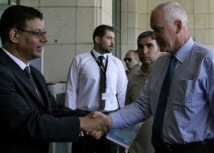
According to the terms of a UN Security Council resolution passed at the weekend in a bid to avert US-led military strikes on Syria, the "unprecedented" mission must be completed by mid-2014.
"At this point, we have absolutely no reason to doubt the information provided by the Syrian regime," an OPCW official who cannot be named for security reasons told journalists at headquarters in The Hague on Sunday.
Syria has already supplied a list of its chemical weapons and facilities, and is due to provide further details by Friday under the terms of the resolution that saw Syria sign up to the Chemical Weapons Convention (CWC).
The experts will arrive in Damascus on Tuesday and immediately meet officials from President Bashar al-Assad's regime. They are to visit all production and storage sites that Syria has identified.
They will initially use "expedient methods" to render production facilities unusable, before moving on to destroying actual ordinance.
Such methods include "smashing something with a sledgehammer, using explosives (or) driving a tank over something," the official said.
"Our first priority is to make the production facilities unusable," OPCW spokesman Michael Luhan said.
Syria is believed to have around 1,000 tonnes of chemical weapons, including sarin and mustard gas.
These are forbidden by the CWC, whose terms Syria has agreed to abide by.
"These don't meet the requirements of the convention, so later, we might use other methods," the official said.
The CWC also bars countries that have agreed to destroy their chemical weapons from transporting them within or outside a country, further complicating the daunting task.
Cleanups of chemical arms have been staged in Iraq and Libya, but never in the midst of a raging war.
The official said the experts were well aware of the inherent risks of carrying out such an operation in a war zone.
"We are not going on a 'come what may' mission type," the official said.
The United Nations will provide the experts with risk assessments, and the Syrian regime is obliged under the CWC to ensure their security.
The threat of Western military action after a massive and deadly sarin gas attack outside Damascus on August 21 spurred Syria to agree to the destruction of its chemical arsenal.
The United Nations says the Syrian conflict has already left more than 100,000 dead.
------------------------------------------------------------------------------------------
"At this point, we have absolutely no reason to doubt the information provided by the Syrian regime," an OPCW official who cannot be named for security reasons told journalists at headquarters in The Hague on Sunday.
Syria has already supplied a list of its chemical weapons and facilities, and is due to provide further details by Friday under the terms of the resolution that saw Syria sign up to the Chemical Weapons Convention (CWC).
The experts will arrive in Damascus on Tuesday and immediately meet officials from President Bashar al-Assad's regime. They are to visit all production and storage sites that Syria has identified.
They will initially use "expedient methods" to render production facilities unusable, before moving on to destroying actual ordinance.
Such methods include "smashing something with a sledgehammer, using explosives (or) driving a tank over something," the official said.
"Our first priority is to make the production facilities unusable," OPCW spokesman Michael Luhan said.
Syria is believed to have around 1,000 tonnes of chemical weapons, including sarin and mustard gas.
These are forbidden by the CWC, whose terms Syria has agreed to abide by.
"These don't meet the requirements of the convention, so later, we might use other methods," the official said.
The CWC also bars countries that have agreed to destroy their chemical weapons from transporting them within or outside a country, further complicating the daunting task.
Cleanups of chemical arms have been staged in Iraq and Libya, but never in the midst of a raging war.
The official said the experts were well aware of the inherent risks of carrying out such an operation in a war zone.
"We are not going on a 'come what may' mission type," the official said.
The United Nations will provide the experts with risk assessments, and the Syrian regime is obliged under the CWC to ensure their security.
The threat of Western military action after a massive and deadly sarin gas attack outside Damascus on August 21 spurred Syria to agree to the destruction of its chemical arsenal.
The United Nations says the Syrian conflict has already left more than 100,000 dead.
------------------------------------------------------------------------------------------









 Home
Home Politics
Politics









